Premier League sack race stats: Why clubs are increasingly changing managers early in the season
Published:
Premier League managers are under more pressure than ever, with 2022-23 having set a new record of 14 in-season departures – four more than any previous campaign.
With Chelsea, Tottenham, Bournemouth and Wolves also having changed bosses during the summer, nine clubs will begin the 2023-24 season with a manager who has been in charge for less than a year.
Who will be the first to depart in the new campaign? Our study of the Premier League sack race stats can help identify the key trends.
We have analysed the reigns of every manager who left their job during a Premier League season due to either being sacked, resigning or leaving by ‘mutual consent’. This excludes caretakers, departures during the summer or those who left for another job.
What is the fastest Premier League sacking?
Bournemouth’s Scott Parker won the sack race last season – the former England midfielder was dismissed following a crushing 9-0 defeat against Liverpool, just 25 days into the campaign.
However, this was not quite early enough to make the Premier League’s all-time top 10, with the late Gianluca Vialli retaining 10th spot having been sacked by Chelsea after 24 days of the 2000-01 season.
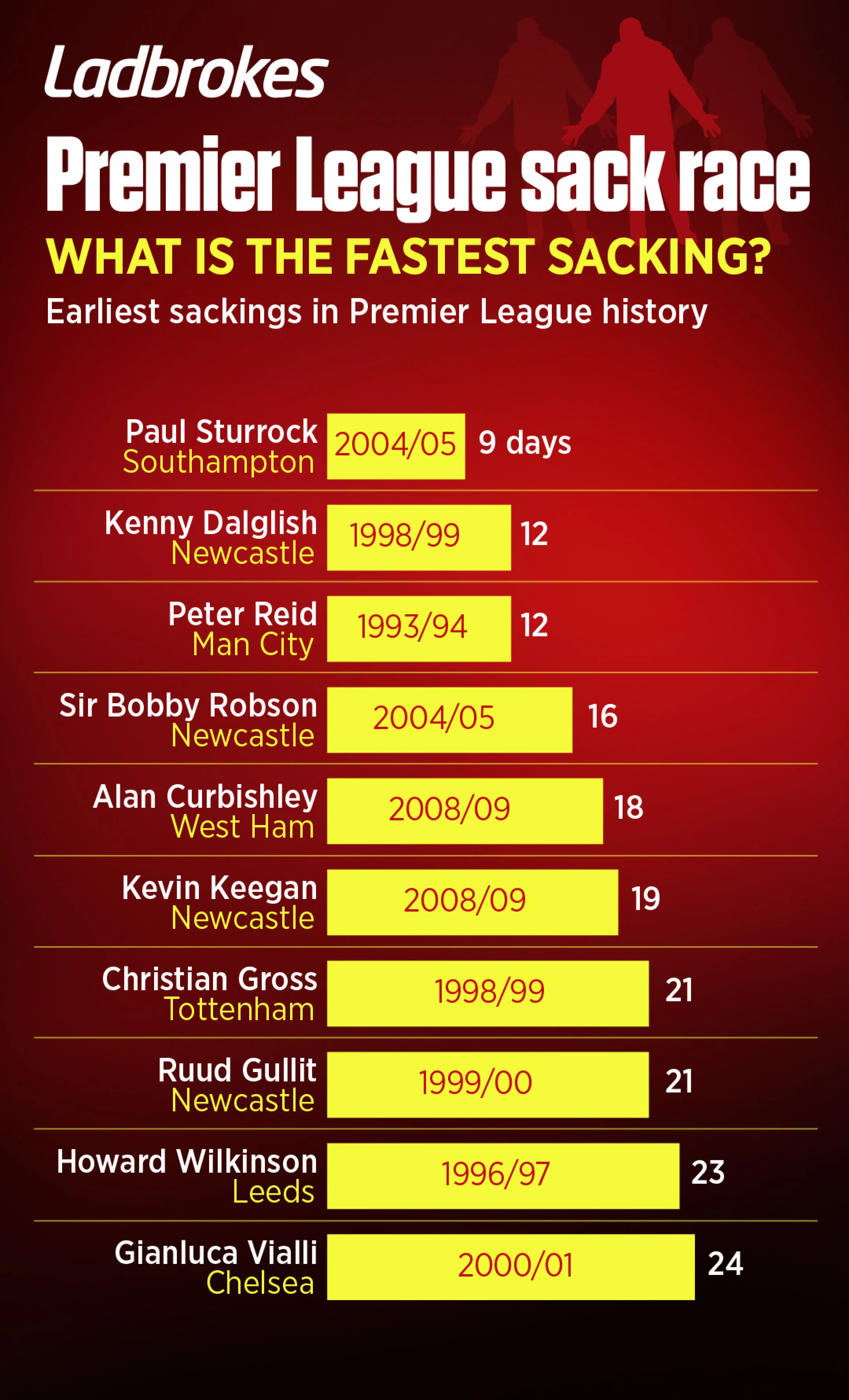
Former Southampton boss Paul Sturrock holds the record for the earliest dismissal, having left St Mary’s by mutual consent only nine days into the 2004-05 campaign. Sturrock took charge of two games in that time, losing the opener at Aston Villa before bouncing back with a 3-2 home win over Blackburn. He left the club a few days later, with his replacement, Steve Wigley, only lasting until December before Harry Redknapp eventually failed to save the Saints from relegation.
How long do we normally have to wait for the first sacking?
More than three-quarters of Premier League seasons to date – 24 out of 31 – have seen at least one manager lose their job in the first 100 days of the campaign. This includes all of the last eight, with 2021-22 and 2022-23 seeing a record five dismissals in the 100-day timeframe.
Last season, Bournemouth’s Parker, Chelsea’s Thomas Tuchel, Wolves’ Bruno Lage, Aston Villa’s Steven Gerrard and Southampton’s Ralph Hasenhuttl were all given the chop before the winter World Cup got under way in mid-November.
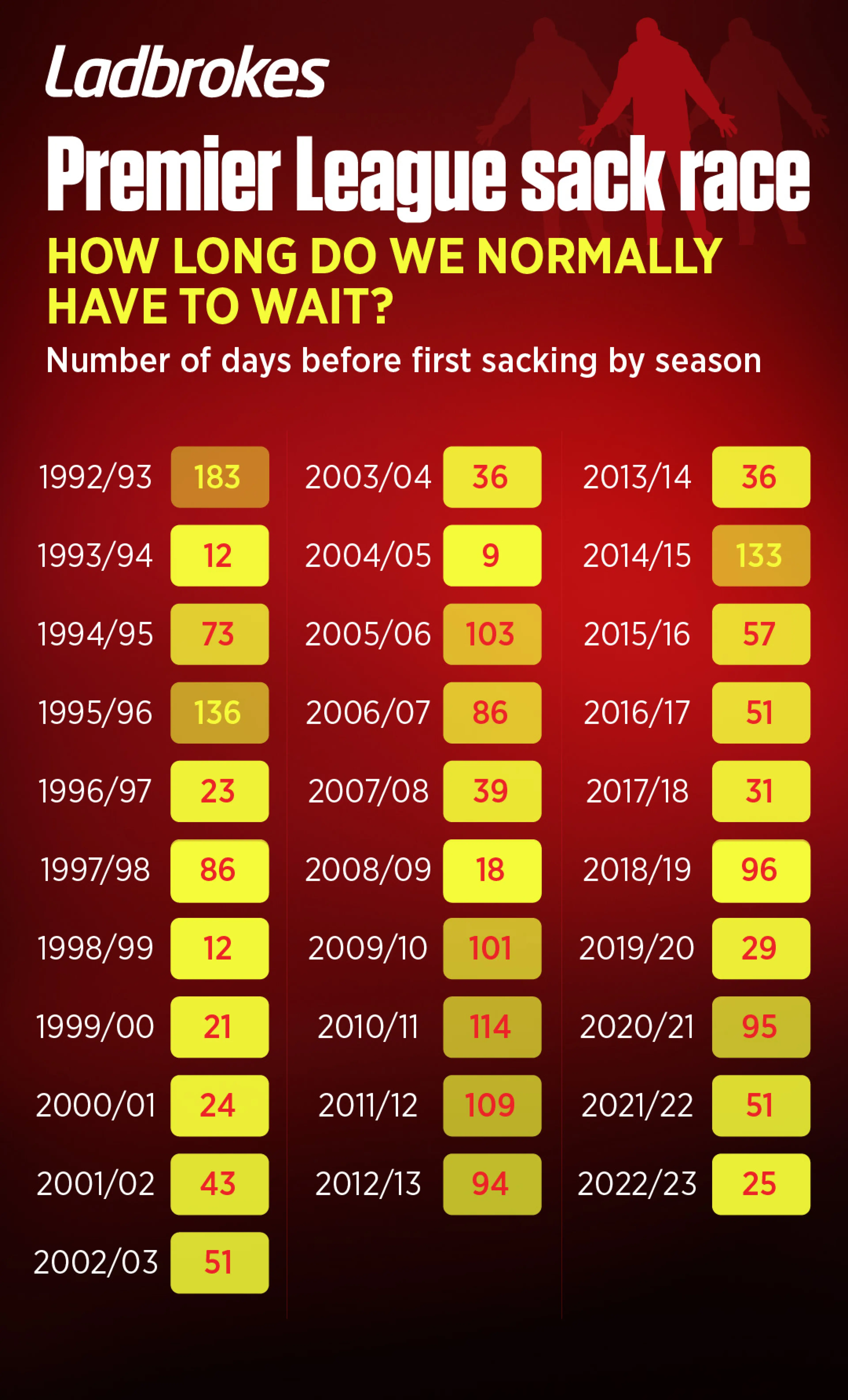
The longest wait for a manager to be sacked occurred all the way back in 1992-93, when Chelsea’s Ian Porterfield became an unwitting trailblazer by losing his job in the Premier League’s inaugural season.
Which clubs are most ruthless?
Tottenham have wielded the axe on seven occasions in the first 100 days of a campaign, which is the most of any Premier League club.
Five of these have come during Daniel Levy’s tenure as chairman, with Glenn Hoddle (2003-04), Jacques Santini (2004-05), Martin Jol (2007-08), Juande Ramos (2008-09) and Nuno Espirito Santo (2021-22) all paying the price for poor starts to the season.
Ossie Ardiles (1994-95) and Christian Gross (1998-99) also suffered early firings under Spurs’ previous chairman Alan Sugar.
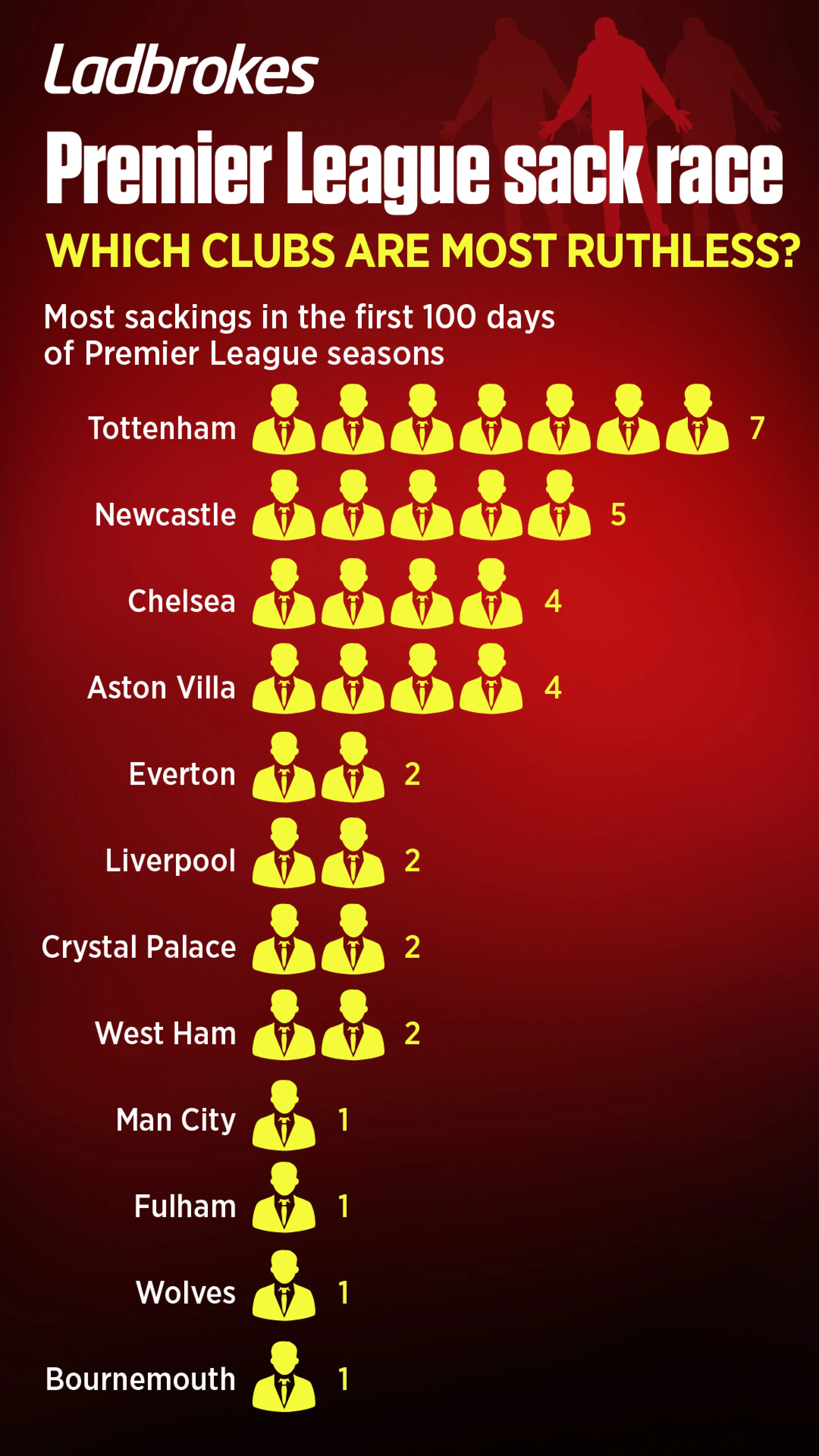
Newcastle are second on the list with five early sackings, with Steve Bruce most recently given his marching orders by the club’s Saudi owners in 2021-22. The remaining four dismissals in question – Kenny Dalglish (1998-99), Ruud Gullit (1999-00), Sir Bobby Robson (2004-05) and Kevin Keegan (2008-09) – all rank in the top 10 earliest of the Premier League era.
In contrast, Premier League ever-presents Arsenal and Manchester United have never sacked a manager in the first 100 days of a season, thanks in no small part to employing Arsene Wenger and Sir Alex Ferguson – the two longest-serving bosses in the league’s 31-year history.
Does it make sense to act quickly?
While early sackings are usually accompanied by fans and pundits complaining that the departing manager should have been given more time to turn things around, the Premier League sack race stats indicate that it is better to pull the trigger early if things aren’t working.
Almost 70 per cent of clubs who sacked their manager in the first 100 days of the season saw their league position improve across the remainder of the campaign, compared with 41 per cent of teams who acted later.
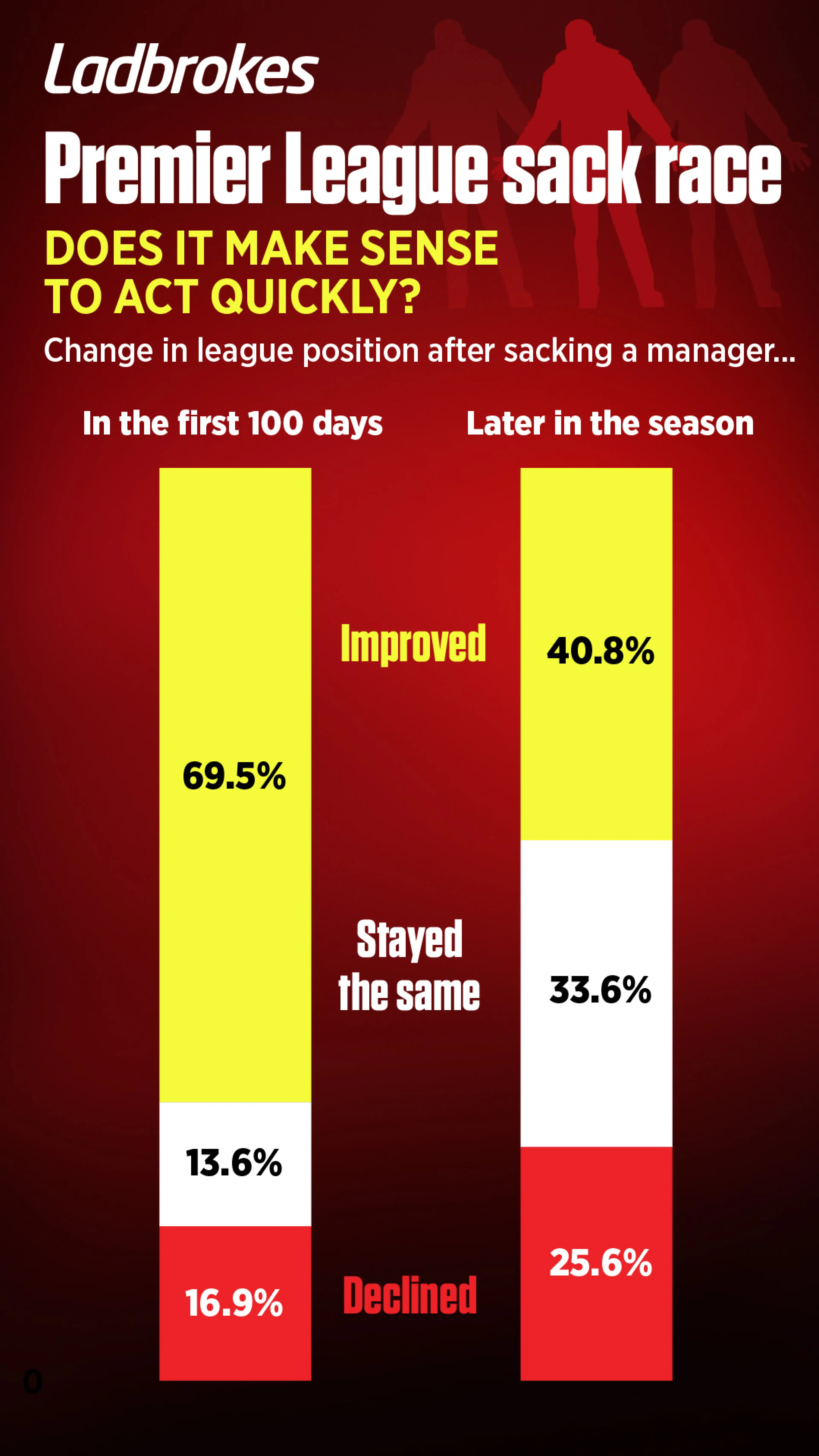
This trend is even more stark for clubs who find themselves in the relegation zone. Twenty-two out of 35 sides (63 per cent) who were in the bottom three when they sacked their manager in the first 100 days of the season went on to survive, compared to 13 out of 51 (26 per cent) who waited longer before making a change.
Which early sackings paid off and which backfired?
Tottenham’s decision to get rid of Ramos in 2008 is the greatest vindication of this approach. Spurs were bottom of the league with two points from eight games when Ramos was sacked, before his replacement Harry Redknapp masterminded a superb revival. Tottenham went on to finish eighth with 51 points, before qualifying for the Champions League in the following season.
Among recent early dismissals, Gerrard’s departure from Aston Villa paid off handsomely last season as Villa rose from 17th to seventh under Unai Emery.
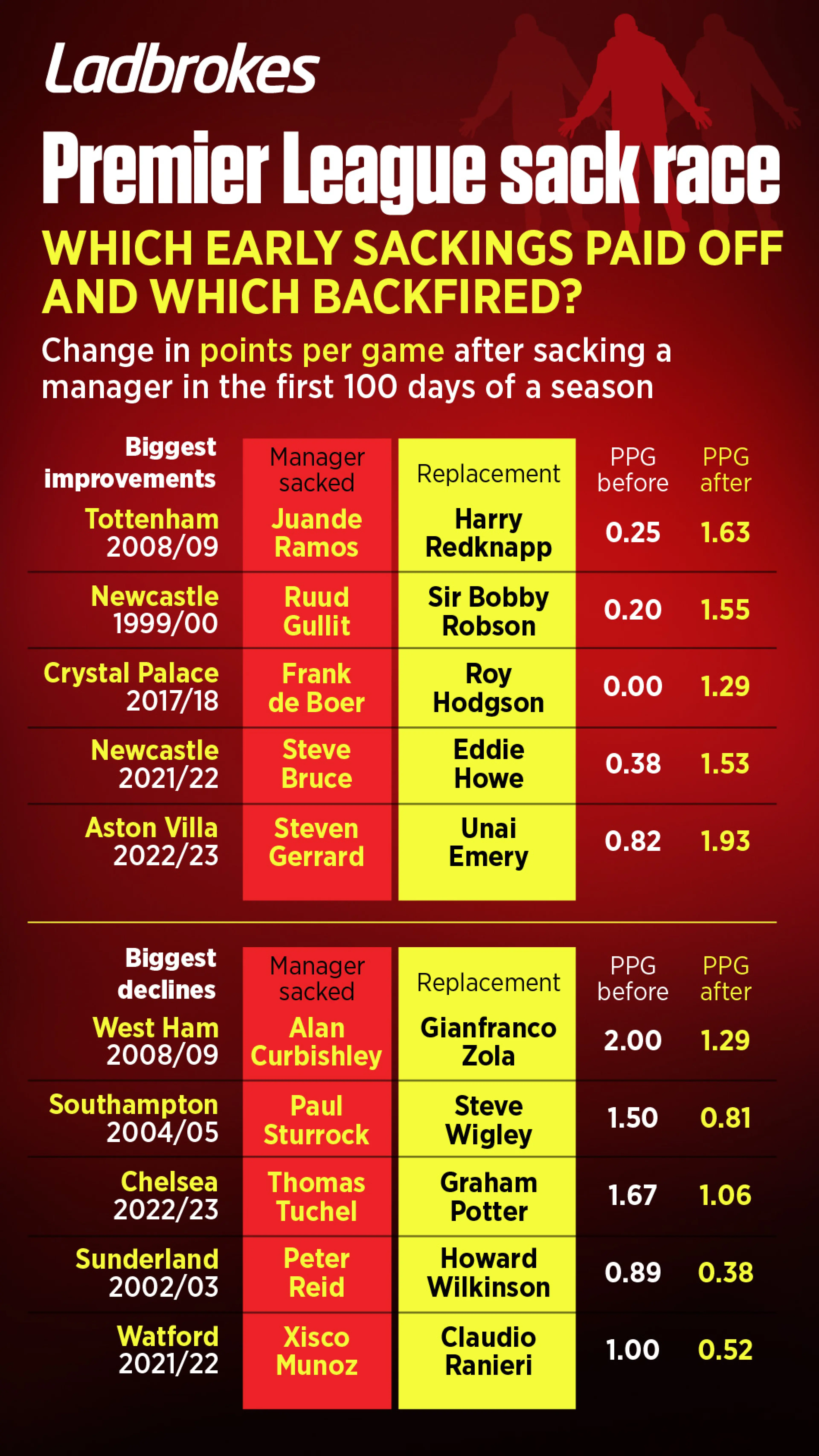
On the other hand, some of the Premier League’s quickfire departures have been detrimental, with Alan Curbishley’s resignation from West Ham in 2008 triggering a significant downturn in the club’s fortunes. The Hammers were fifth at the time and eventually finished ninth, before slumping to 17th in 2009-10 and ultimately relegation in 2010-11.
Tuchel’s Chelsea sacking had a similarly dismal effect last season, with the Blues dropping from sixth to 12th and their lowest ever Premier League points total.








